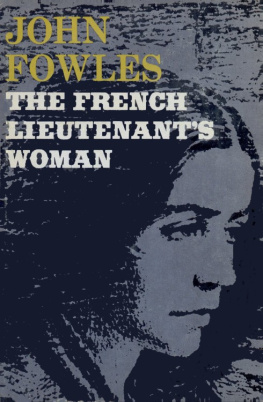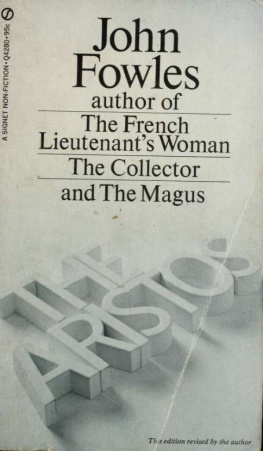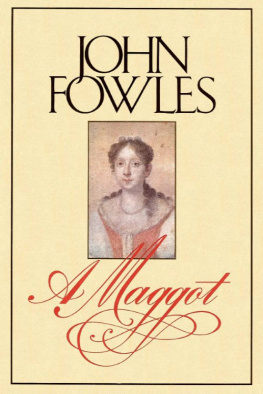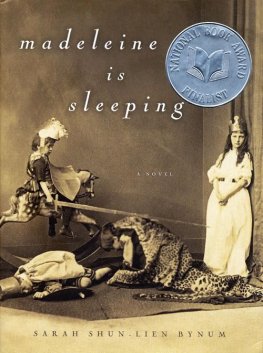THE FRENCHLIEUTENANT'S WOMAN
John Fowles
Copyright 1969 by John Fowles
SignetEdition
Library of CongressCatalog Card Number: 77-86616
FirstPrinting, august, 1970
Everyemancipation is a restoration of the human
worldand of human relationships to man himself.
M arx,Zur Judenfrage (1844)
It opened out veryagreeably, like a tiny alpine meadow. The white scuts of three orfour rabbits explained why the turf was so short.
Charles stood in thesunlight. Eyebright and birdsfoot starred the grass, and alreadyvivid green clumps of marjoram reached up to bloom. Then he movedforward to the edge of the plateau.
And there, below him, hesaw a figure.
For one terrible momenthe thought he had stumbled on a corpse. But it was a woman asleep.She had chosen the strangest position, a broad, sloping ledge ofgrass some five feet beneath the level of the plateau, and which hidher from the view of any but one who came, as Charles had, to thevery edge. The chalk walls behind this little natural balcony made itinto a sun trap, for its widest axis pointed southwest. But it wasnot a sun trap many would have chosen. Its outer edge gave onto asheer drop of some thirty or forty feet into an ugly tangle ofbrambles. A little beyond them the real cliff plunged down to thebeach. Charles's immediate instinct had been to draw back out of thewoman's view. He did not see who she was. He stood at a loss, lookingat but not seeing the fine landscape the place commanded. Hehesitated, he was about to withdraw; but then his curiosity drew himforward again.
The girl lay in thecomplete abandonment of deep sleep, on her back. Her coat had fallenopen over her indigo dress, unrelieved in its calico severity exceptby a small white collar at the throat. The sleeper's face was turnedaway from him, her right arm thrown back, bent in a childlike way. Ascattered handful of anemones lay on the grass around it. There wassomething intensely tender and yet sexual in the way she lay; itawakened a dim echo of Charles of a moment from his time in Paris.Another girl, whose name now he could not even remember, perhaps hadnever known, seen sleeping so, one dawn, in a bedroom overlooking theSeine.
He moved round thecurving lip of the plateau, to where he could see the sleeper's facebetter, and it was only then that he realized whom he had intrudedupon. It was the French Lieutenant's Woman. Part of her hair hadbecome loose and half covered her cheek. On the Cobb it had seemed tohim a dark brown; now he saw that it had red tints, a rich warmth,and without the then indispensable gloss of feminine hair oil. Theskin below seemed very brown, almost ruddy, in that light, as if thegirl cared more for health than a fashionably pale andlanguid-cheeked complexion. A strong nose, heavy eyebrows ... themouth he could not see. It irked him strangely that he had to see herupside down, since the land would not allow him to pass round for theproper angle.
He stood unable to doanything but stare down, tranced by this unexpected encounter, andovercome by an equally strange feeling--not sexual, but fraternal,perhaps paternal, a certainty of the innocence of this creature, ofher being unfairly outcast, and which was in turn a factor of hisintuition of her appalling loneliness. He could not imagine what,besides despair, could drive her, in an age where women weresemistatic, timid, incapable of sustained physical effort, to thiswild place.
He came at last to thevery edge of the rampart above her, directly over her face, and therehe saw that all the sadness he had so remarked before was gone; insleep the face was gentle, it might even have had the ghost of asmile. It was precisely then, as he craned sideways down, that sheawoke.
She looked up at once,so quickly that his step back was in vain. He was detected, and hewas too much a gentleman to deny it. So when Sarah scrambled to herfeet, gathering her coat about her, and stared back up at him fromher ledge, he raised his wideawake and bowed. She said nothing, butfixed him with a look of shock and bewilderment, perhaps not untingedwith shame. She had fine eyes, dark eyes. They stood thus for severalseconds, locked in a mutual incomprehension. She seemed so small tohim, standing there below him, hidden from the waist down, clutchingher collar, as if, should he take a step towards her, she would turnand fling herself out of his sight. He came to his sense of what wasproper. " Athousand apologies. I came upon you inadvertently." And then heturned and walked away. He did not look back, but scrambled down tothe path he had left, and back to the fork, where he wondered why hehad not had the presence of mind to ask which path he was to take,and waited half a minute to see if she was following him. She did notappear. Very soon he marched firmly away up the steeper path.
Charles did not know it,but in those brief poised seconds above the waiting sea, in thatluminous evening silence broken only by the waves' quiet wash, thewhole Victorian Age was lost. And I do not mean he had taken thewrong path.
11
With the formconforming duly,
Senselesswhat it meaneth truly,
Goto church--the world require you,
Toballs--the world require you too,
Andmarry--papa and mama desire you,
Andyour sisters and schoolfellows do.
-- A.H. Clough, "Duty" (1841) " Oh!no, what he!" she cried in scorn,
" Iwoulden gi'e a penny vor'n;
Thebest ov him's outzide in view;
Hiscwoat is gay enough, 'tis true,
Butthen the wold vo'k didden bring
Enup to know a single thing..."
-- WilliamBarnes, Poems in the Dorset Dialect (1869)
At approximately thesame time as that which saw this meeting Ernestina got restlesslyfrom her bed and fetched her black morocco diary from her dressingtable. She first turned rather sulkily to her entry of that morning,which was certainly not very inspired from a literary point of view:"Wrote letter to Mama. Did not see dearest Charles. Did not goout, tho' it is very fine. Did not feel happy."
It had been a verydid-not sort of day for the poor girl, who had had only Aunt Tranterto show her displeasure to. There had been Charles's daffodils andjonquils, whose perfume she now inhaled, but even they had vexed herat first. Aunt Tranter's house was small, and she had heard Sam knockon the front door downstairs; she had heard the wicked and irreverentMary open it--a murmur of voices and then a distinct, suppressedgurgle of laughter from the maid, a slammed door. The odious andabominable suspicion crossed her mind that Charles had been downthere, flirting; and this touched on one of her deepest fears abouthim.
She knew he had lived inParis, in Lisbon, and traveled much; she knew he was eleven yearsolder than herself; she knew he was attractive to women. His answersto her discreetly playful interrogations about his past conquestswere always discreetly playful in return; and that was the rub. Shefelt he must be hiding something--a tragic French countess, apassionate Portuguese marquesa. Her mind did not allow itself to runto a Parisian grisette or an almond-eyed inn-girl at Cintra, whichwould have been rather nearer the truth. But in a way the matter ofwhether he had slept with other women worried her less than it mighta modern girl. Of course Ernestina uttered her autocratic "Imust not" just as soon as any such sinful speculation crossedher mind; but it was really Charles's heart of which she was jealous.That, she could not bear to think of having to share, eitherhistorically or presently. Occam's useful razor was unknown to her.Thus the simple fact that he had never really been in love becameclear proof to Ernestina, on her darker days, that he had once beenpassionately so. His calm exterior she took for the terrible silenceof a recent battlefield, Waterloo a month after; instead of for whatit really was--a place without history.













